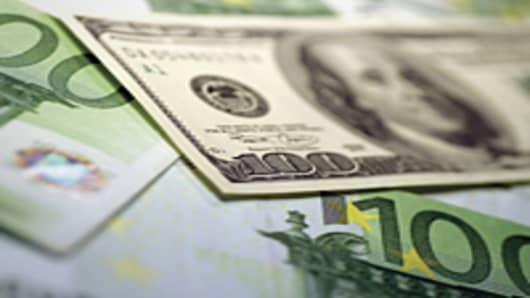No good crisis comes without good opportunities, and the events unfolding with European debt are no exception.
Investors already have been aggressive in showing how they might profit from difficulties in Greece and other nations that are being crushed by low-quality debt.
US and European equity markets have rebounded after a massive knee-jerk selloff, government bonds steadied, and commodities offered a mixed bag. In short, financial markets adjusted to a world in which the focus has switched from the breakdown in the US to widely varied situations around the rest of the globe.
"It's a market where you've got considerable risk remaining from what created the problem as well as considerable opportunity coming from the economic improvement," says John Stoltzfus, senior market strategist at Ticonderoga Securities in New York.
"The risk of contagion remains in this market," he adds. "We would be foolish not to acknowledge that. It's just that the offsets remain substantial and we can't help but think it's the formidable offsets that are worthy of consideration from investors."
Four ideas, then, from market pros about dealing with the European debt crisis.
1) Yes to US equities
Stocks got hammered earlier in the week as news intensified about credit downgrades in Portugal and Greece, but then largely shrugged off a downgrade Wednesday of Spain's credit.
Investors seem to have decided that US assets are the place to be as credit problems play out overseas.
"Investors are going to see a flight to quality," says Mike O'Rourke, chief market strategist at BTIG in New York. "They still want to be investing, they still want stocks and bonds. But they're going to invest in US stocks and bonds rather than assets in other parts of the world. By shifting your European exposure to the US, it's a good way to be defensive about that crisis."
O'Rourke thinks the reaction may not be immediate but should be broad-based. He favors health care, technology and industrials, and says investors who want to hedge should look at shorting overpriced consumer discretionary stocks.
Investors can take some money off the table now, but shouldn't overdo it, says Paul Zemksy, head of asset allocation at ING Investment Management in New York.
"We're not running for the hills and selling stocks or selling high-yields or putting clients into cash," he says. "It's equally risky to be out of the equity market given how strong the fundamentals are as it is to be overweight, because Greece might do something bad and you have to sell off."
2) Yes to European Multinationals
Though the European markets may wobble as they adjust to whatever final form emerges for Greece's rescue package, individual companies there nevertheless should do well, particularly those that do business in emerging markets.
During the collapse of the financial system, European countries took much the same route as their US counterparts: Cutting costs through reductions in employment and increasing productivity.
Those companies who excelled at the process will be the best places to invest, Stoltzfus says.
"Investors should look for companies that have their domiciles in Europe but do a lot of business in emerging markets," he says. "Europeans have been doing business in emerging markets for 500 years, and today multinationals are very well-positioned. In the quarter to come, those are likely to look very attractive."
3) No to Commodities
Oil prices have been trading in a tight range above $80 since mid-February. But at least one analyst thinks the Greek crisis "could also be the catalyst for a long overdue correction" in a market that has come under suspicion for ignoring demand and economic fundamentals.
"Many participants in these markets seem to assume that the world economy is returning to the strong growth that fueled the commodity price boom from 2004 to 2007 as if nothing has happened in the meantime," John Higgins, senior market economist with Capital Economics in London, wrote in a note to clients.
Higgins thinks oil will slide back to $60 a barrel while copper will fall to $5,000 per ton, which would be a drop of about 24 percent.
"While good news for consumers, a collapse in commodity prices would be another shock for financial markets," Higgins said. "It would be bad news for many emerging economies, particularly Russia and Latin America."
4) Yes to Bonds (No to Euro)
The week's events did little to shake the notion that the euro is likely to be the favorite whipping boy among the world's currencies.
Investors have solidified their positions against the European currency, but believe some government debt as well as investment-grade corporate debt will be in fashion as protection against any fallout that does come from Europe.
"In a flight to quality, risk is being reprocessed in the marketplace as we see investors filing into US Treasurys and the strengthening of the US dollar," says Elizabeth Fell, fixed income strategist at Barclays Wealth in New York. "Anyone holding a fixed income instrument in the US had a little rally."
Fell says Barclays is watching the Greece situation carefully but is sticking with its strategy of being overweight equities and keeping a strong fixed-income component with a bias toward developed countries rather than emerging markets.
"The whole European zone shouldn't be thrown out. There are a lot of powerful companies in Germany and France that are profitable and will continue to be profitable," she says. "People should be careful."



